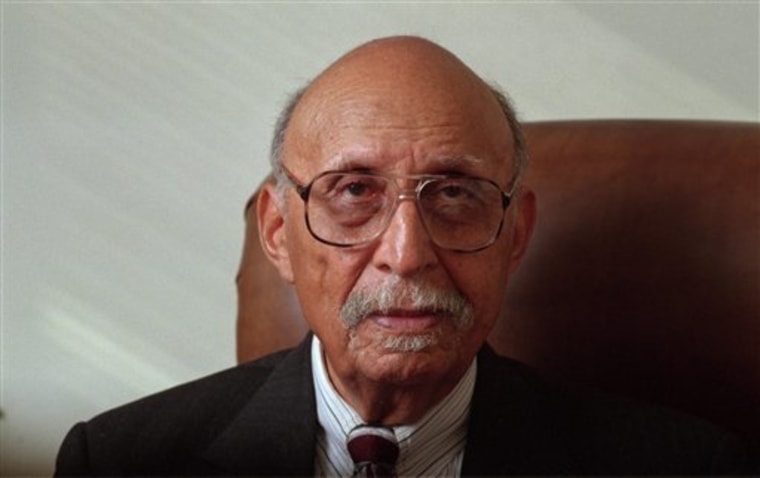Oliver W. Hill, a civil rights lawyer who was at the front of the legal effort that desegregated public schools, has died at age 100, a family friend said.
Hill died peacefully Sunday at his home during breakfast, said Joseph Morrissey, a friend of the Hill family.
In 1954, he was part of a series of lawsuits against racially segregated public schools that became the U.S. Supreme Court’s landmark Brown v. Board of Education decision, which changed America’s society by setting the foundation for integrated education.
“He was among the vanguard in seeking equal opportunity for all individuals, and he was steadfast in his commitment to effect change. He will be missed,” said L. Douglas Wilder, who in 1989 became the nation’s first elected black governor and was a confidant of Hill’s. Wilder is now Richmond’s mayor.
In 1940, Hill won his first civil rights case in Virginia, one that required equal pay for black and white teachers. Eight years later, he was the first black elected to Richmond’s City Council since Reconstruction.
A lawsuit argued by Hill in 1951 on behalf of students protesting deplorable conditions at their high school for blacks in Farmville became one of five cases decided under Brown.
Those battles to end the Jim Crow era were dangerous ones for Hill and other civil rights leaders. Hill once received so many threats that he and his wife, Berensenia, would not allow their son to answer the telephone.
Nor did his battle for civil rights bring him wealth.
“We got very few fees for any of this,” he said in a 1992 interview in The Richmond News Leader.
Hill never lost sight of the importance of the 1954 court ruling. Without it, he said in an interview in the Richmond Times-Dispatch this year, “I doubt (the Rev. Martin Luther) King would have gotten to first base.”
Hill was born May 1, 1907, and his father left when Hill was an infant. His mother remarried, and Hill took the name of his stepfather. He moved with his family to Roanoke, where he spent much of his childhood.
Pride in his black heritage
His mother was a maid and his stepfather was a bellman at an exclusive resort about 70 miles from Roanoke. While his parents worked, Hill stayed with a family that he says instilled in him pride in his black heritage.
“Consequently, from childhood I developed personal esteem and expected white folks to treat me like they did one another in such settings,” Hill wrote in his autobiography.
Later, his family moved to Washington, where he graduated from high school and graduated second in his class from Howard University’s law school in 1933. The top law graduate that year was his friend Thurgood Marshall.
Marshall and Hill were part of the NAACP Legal Defense and Education Fund team that fought the desegregation case to the Supreme Court. They remained close friends after Marshall became the court’s first black justice.
He had recalled that when he started his law career, the court clerks in the building that housed the state Supreme Court of Appeals and law library allowed him to review legal books over weekends with the understanding that he would return them Monday mornings — “quite a gesture for those days,” Hill said.
Two years ago, that building — now a century old and renovated — was renamed in Hill’s honor. Though frail, he attended the 2005 dedication and, in a statement read by his son, said: “Who would have thought back in 1939, given the racial climate at the time, that 66 years later that building would be named after me.”
Also in 2005, the National Association for the Advancement of Colored People honored Hill with its Spingarn Award for distinguished achievement. Earlier winners included King, home run record holder Hank Aaron, the Rev. Jesse Jackson and Rosa Parks.
Though blind and in a wheelchair in recent years, Hill remained active in social and civil rights causes. He remained active in the day-to-day operations of his law firm until 1998. The next year, he received the Presidential Medal of Freedom, the nation’s highest civilian honor, from President Bill Clinton.
In 2003, Hill urged a Virginia legislative committee to support a resolution expressing “profound regret” for what was known in the 1950s as “Massive Resistance,” the state-led effort to defy the Supreme Court’s desegregation order. Rather than desegregate, Virginia chose to close entire public schools.
This past May, state officials unveiled images of a memorial planned on the state Capitol grounds in Richmond that features Hill and the students who staged the 1951 walkout at Farmville. The $2.6 million monument is to be unveiled next July. He also greeted Queen Elizabeth II during her visit to the state Capitol to commemorate the 400th anniversary of the founding of Jamestown, the first permanent English settlement in North America.
